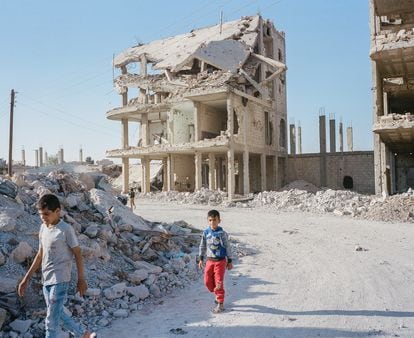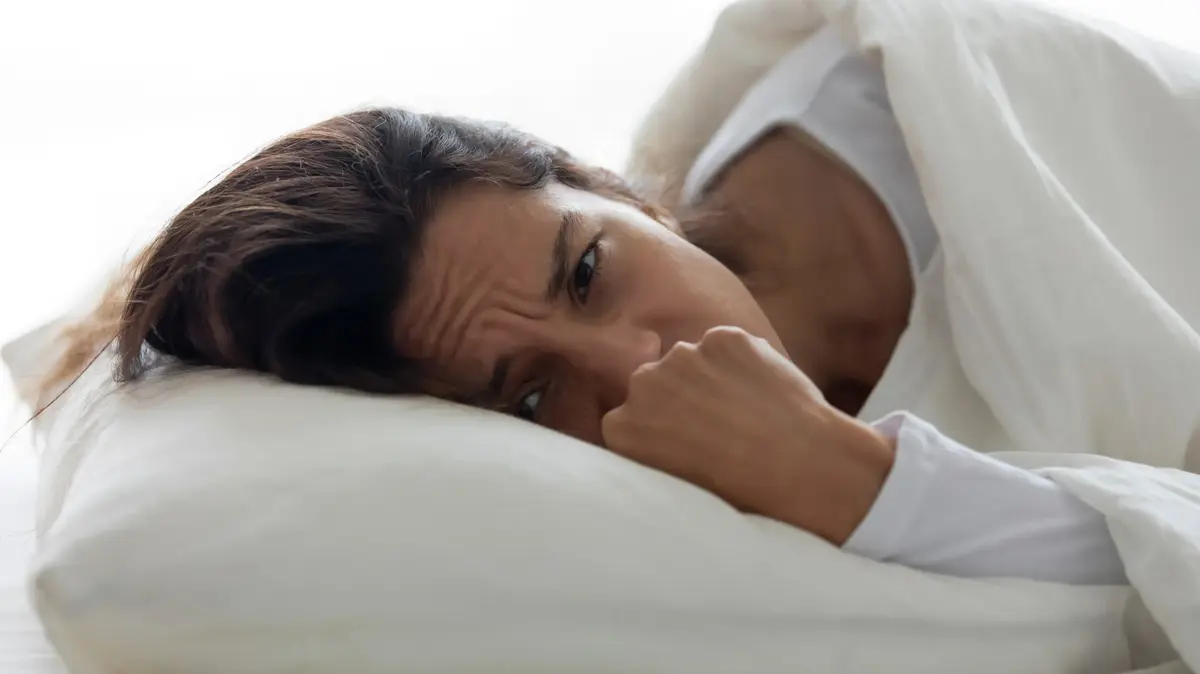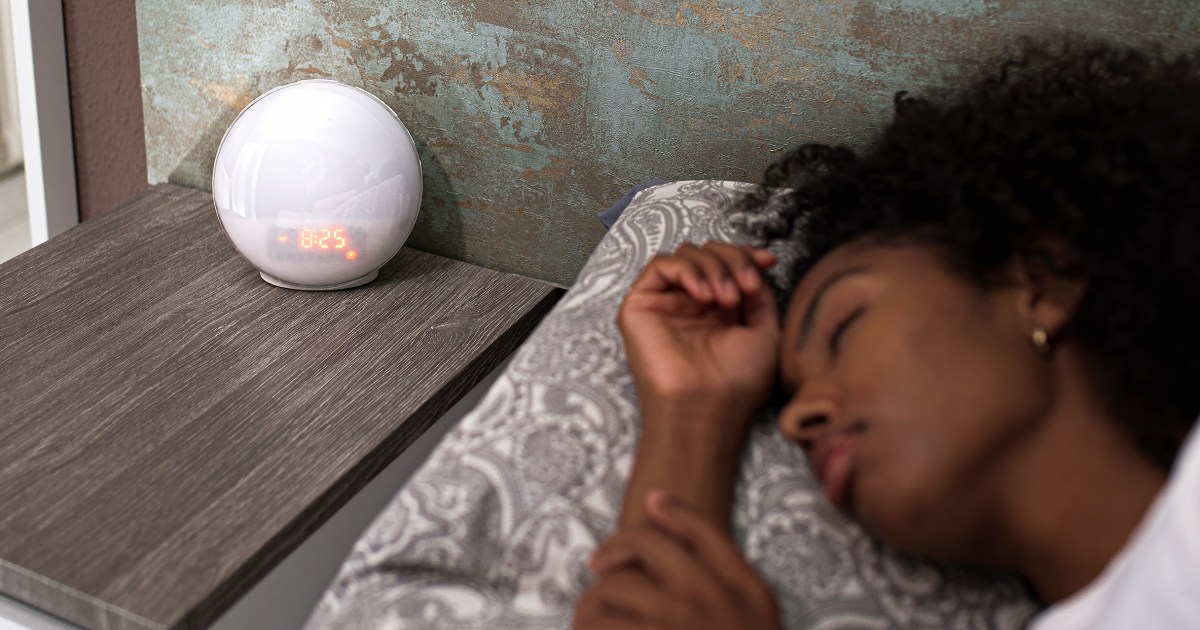The desks of what used to be a classroom and where Riham now lives are used by her mother to change her little brother's diapers.
The blackboard has been turned into a coat rack, and a few pots hang from nails on top.
The table where the teacher used to sit is the one used by the family to store most of the utensils, while they sit on the floor to eat.
The desks are moved to one side of the room, where the mattresses are placed during the day.
At night, the family sleeps on those same pallets, placed on the floor.
PHOTO GALLERY
Syria: my house is a school
Little Riham realizes that her family lives in the classroom of an old school, but she still thinks that one day she will go to school to study, not to sleep.
She is eight years old, and she has never received even a basic education.
Like Riham and her siblings in a village in Hasake Governorate, millions of displaced Syrian children across the country live in extreme poverty, without food or water, and education is probably the least of their parents' concerns. .
Children bear the brunt of the 10-year conflict in Syria.
Of the seven million internally displaced persons in the country, 3.1 million are minors.
Humanitarian needs have increased by more than a quarter since 2020 due to the economic crisis, ongoing violence, hostilities, mass displacement, the breakdown of public services, drought, the water crisis and the covid pandemic. -19, which has only aggravated child poverty in Syria.
Currently, there are 1.75 million students out of school and 1.35 million at risk of dropping out.
School buildings have been destroyed, occupied, damaged, or have become shelters for displaced families.
The bitter irony is that there are children like Riham who live temporarily in the classrooms of old schools,
Two children walk through the center of the Kurdish city of Kobane, on the Syrian-Turkish border.Alessio Mamo (Alessio Mamo)
Riham's family, originally from the village of Ras al-Ayn, was displaced in October 2019, when Ottoman bombs targeted their village and later, Turkish-backed Syrian opposition armed groups occupied the entire northeast area. of the country bordering Turkey.
They left behind their home and the small field they owned, and have since lived in a village in Hasake Governorate, where the local community has welcomed them and provided them with food, blankets, mattresses and basic utensils for the first few days. .
Fearing what their life would be like under the extremist armed groups now installed on their land, they have never returned.
“I know she's very smart, and I can tell she aspires to something more,” says Riham's mother, Mariam, looking down at her daughter as she rubs her belly.
“I am five months pregnant and I have not been to the doctor.
How am I going to send Riham to school if I can't afford local transportation to see a gynaecologist?
After listening carefully to her mother's words, the girl turns her green eyes to her father, Mahmud, a tall man.
“I would very much like my children Riham and Nidhal to learn to read and write.
It's very important.
But we don't have money for clothes, books and notebooks, nor for transportation.
The most we can do for them is to make sure they eat at least once a day.”
As parents cannot afford to send their children to study in neighboring towns, many teachers do not get paid,
and sometimes they are forced to leave teaching.
Some old abandoned schools are collapsing in a conflict that has set the education system back two decades.
Khader and Amina have four children.
None of them can study
The neighbors, who live in the next room, are also members of your family.
Khader, Mahmud's brother, shares his concerns.
“Will I be able to feed my children this week?” he asks his wife, Amina.
The two families fled the shelling and headed on two motorcycles to the nearest safe place.
“We have received 340,000 Syrian pounds (120 euros) a month for three months and we have spent it all on food, thank God,” he says, referring to the cash aid distributed in the village by the LEARN consortium as part of its assistance program. run by Solidarities International.
Khader and Amina have four children.
None of them can study.
“My two oldest daughters, ages 14 and 15, work in agriculture not far from here, and we stay with the two youngest, Louay and Salem.”
Louay interrupts her father enthusiastically: "No, one day, in the morning, we had class," she recalls.
His mother nods.
“Yes, only once.
It was nice,” he adds, referring to a winter day when a group of volunteers came to entertain them.
The families assure that the distribution of money was very good for them, but that, in any case, the amount would not have been enough for more expenses, such as those necessary to send their children to school.
Not far from there, in another village in Hasake Governorate, Manal and 19 families live in an educational center.
“This is not a suitable place for displaced people to live.
We had to adapt until they built the toilets for the adults, especially for the elderly women.”
In addition to distributing cash, the LEARN consortium has provided facilities such as showers and solar panels, and has held hygiene promotion sessions to prevent the spread of disease among the displaced.
“It was a very good lesson for the children, and they had fun.
They learned to wash their hands and disinfect them every time they go to the market, especially to prevent covid-19.
Before we did not know what prevention meant.
Now our children know it, and also how exactly to cover their mouths when they sneeze.”
One of the families living in the classroom of what was once a school in Hasake Governorate. Alessio Mamo
Displaced children are not the only ones who do not study.
Many small townspeople have also been left without an education because their school building has become a shelter.
“For the third year in a row, many children are still without education,” laments Avin*, from the village school management committee.
“We found a solution for five or six centers where displaced people live.
Neighbors volunteered and converted their houses into classes to reduce illiteracy, which was widespread after the attacks on Sere Kaniye (Ras al-Ayn) and Tell Abyad.
But we couldn't find solution for many others.
For the children, not receiving an education is worse than the displacement itself.”
The Kurdish-governed Autonomous Administration of Eastern and Northern Syria (AANES), which administers the Hasake Governorate in the north-east of the country, wanted the displaced to drop out of school to allow other children to continue their education, but the camps that host thousands of internal refugees, like the one in Washokani, cannot accommodate more.
The main city of Hasake also housed thousands of displaced families in such facilities in 2019, disrupting the educational process, and has been trying to relocate them ever since, but has not been able to do so with all of them.
Despite some informal classes in the camps, the majority of the millions of displaced children in Syria remain illiterate.
Despite some informal classes in the camps, the majority of the millions of displaced children in Syria remain illiterate
While the AANES, not recognized as a political entity by any State except the Parliament of Catalonia, has invested its limited resources in starting up and improving services for the displaced population, its armed wing, the Syrian Democratic Forces (FDS), continues fighting the sleeper cells and against the selective ambushes of the Islamic State (IS) insurgency.
The most recent action was a major jail break attack in Hasake, in which IS prisoners acted in coordination with outside sleeper cells, resulting in more than 500 deaths.
The entire area has been put under curfew, and circulation between neighbourhoods, cities and towns has been interrupted, once again preventing the local population from making a living, and their children from going to school.
On the other hand, the SDF continues to defend the front line of the armed groups supported by Turkey, whose missiles recently caused damage to the center where Manal lives.
"The noise of the shelling became our daily background music, we got used to it, but the children did not."
Manal likes his role as a community leader from the old school, but he feels powerless when it comes to children and education.
“Before I was forced to flee my home, she was responsible for my family, which consisted of eight people.
Now I am the community leader of 20 families.
That means 100 people.”
Her children play in what used to be the patio, now transformed into an outdoor kitchen, laundry and playground, near the water tanks and other facilities.
The little ones smile and run around.
They wash their hands with soap using the precise, coordinated and rhythmic movements they have learned, and sing a song.
The only problem, Manal says, is that they don't know how to write it.
You can follow PLANETA FUTURO on
,
and
, and subscribe
to our 'newsletter'
here
.








/cloudfront-eu-central-1.images.arcpublishing.com/prisa/SJ2JE6YG7FA5VFLIRSO2YSLRUM.jpg)
/cloudfront-eu-central-1.images.arcpublishing.com/prisa/C4BOJCQJZFGPJORE3TOF2IPXME.jpg)